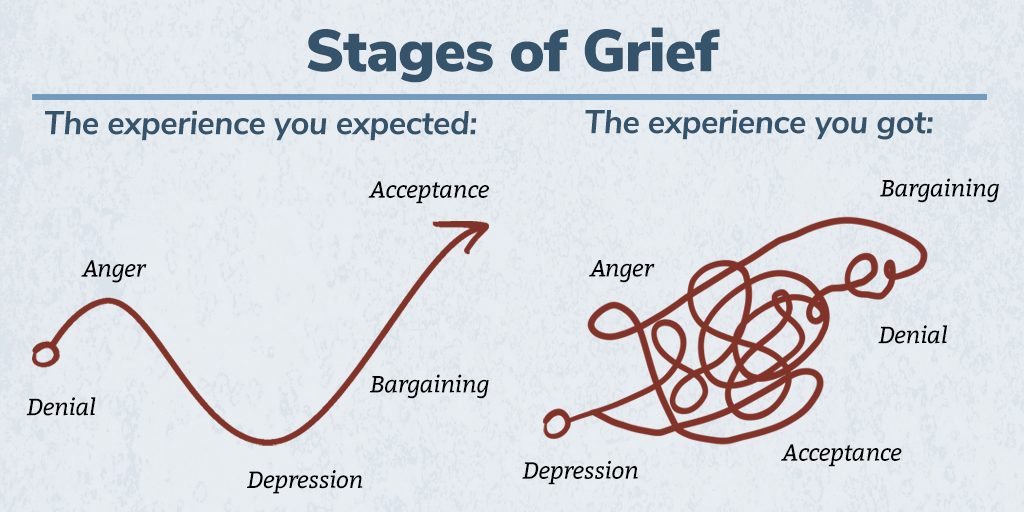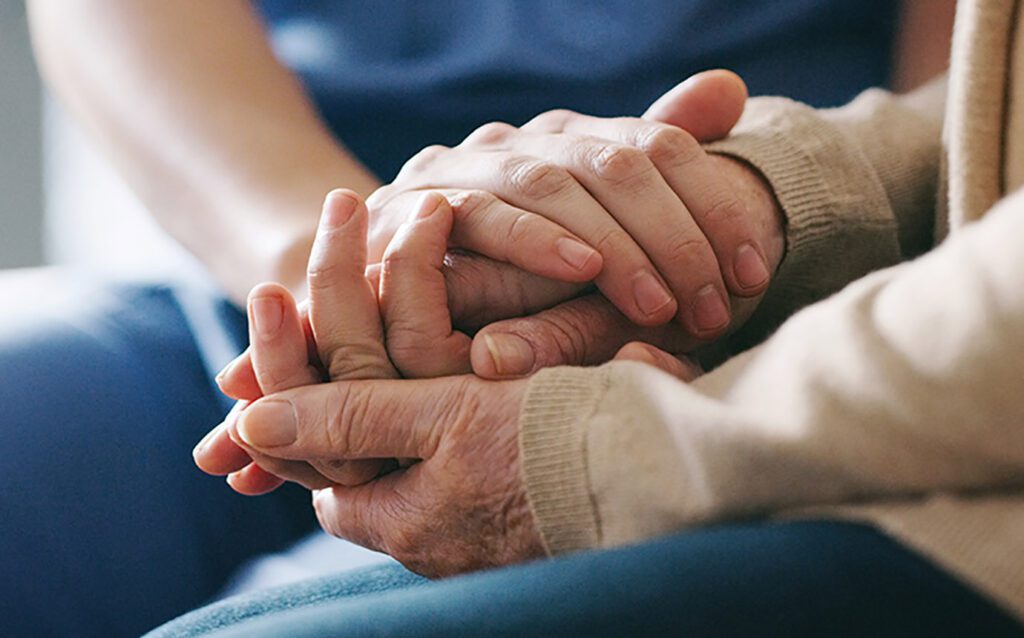Intro
Navigating grief can feel like walking through an emotional storm, where the winds of loss and sorrow can toss you in unpredictable directions. It’s a journey that many of us wish we could avoid, yet it’s a path that we must walk when faced with the heart-wrenching reality of loss. The notion that progress through grief is straightforward is a comforting illusion. Instead, the path to emotional healing is often filled with detours, setbacks, and unexpected turns. Recognizing this complexity can help us approach our own grief with compassion, understanding, and a willingness to embrace the journey—however messy it may be.


Understanding That Grief Is A Personal Journey
Grief is an intensely personal experience, unique to each individual who endures it. Our personal histories, the relationships we cherished, and our own emotional resilience shape the way we navigate through the pain of loss. It’s crucial to understand that there isn’t a one-size-fits-all approach to grieving. What might bring solace to one person could be entirely different for another. This acknowledgment is fundamental in cultivating empathy, not just towards ourselves, but also for others who may express their grief differently.
Society often imposes expectations about how we should grieve—implying there are certain stages to be followed or a specific timeline to adhere to. These societal norms can create an overwhelming sense of pressure, leaving us feeling inadequate or wrong for our authentic responses. However, embracing our unique emotional journey can be liberating. It allows us to shed these external expectations and honor our own needs and feelings.
Recognizing that grief can manifest in various forms—whether through tears, anger, numbness, or even moments of unexpected joy—enables us to approach our healing with greater compassion. This self-awareness encourages us to listen to our inner voices, allowing our emotions to surface naturally without judgment. When we accept the uniqueness of our grief, we give ourselves permission to mourn in a way that feels true to who we are.
In this deeply personal journey, self-understanding becomes a cornerstone for emotional healing. By acknowledging our own path and respecting our feelings, we can better navigate the complexities of grief, fostering a sense of acceptance and inner peace amidst the turmoil.
Recognizing The Non-Linear Nature Of Healing


When we envision the healing process, it’s tempting to picture a straight line from pain to acceptance. However, the truth is far more intricate. Healing from grief often feels like riding unpredictable waves—one moment, you’re riding a crest of hope, and the next, you’re plunged into the depths of sorrow. This ebb and flow are natural and reflect the profound emotional journey you’re on.
Some days might catch you off guard with a sudden flood of memories or emotions that you thought you had already processed. You might feel a sense of progress one week, only to feel like you’ve taken several steps back the next. These fluctuations are not setbacks but rather a testament to the complexity of human emotions. They remind us that healing isn’t about forgetting or moving on, but about finding a way to live with the loss.
This non-linear journey can be frustrating and confusing, but it’s important to remember that it’s okay to have good days and bad days. On some days, you may feel like you’re barely holding on, while on others, you might find yourself genuinely laughing and enjoying life. Both experiences are valid and part of the intricate tapestry of your emotional healing.
By accepting the unpredictable nature of grief, we can extend ourselves the grace to experience our emotions as they come, without guilt or self-judgment. This acceptance helps us to navigate our path with greater compassion and understanding, recognizing that the journey of healing is as unique and varied as our individual experiences of loss.
The Role Of Self-Compassion In Grief
In the throes of grief, self-compassion becomes an essential lifeline. It’s easy to fall into the trap of self-criticism, berating yourself for not moving through the grieving process as quickly as you think you should. You may even feel guilty for experiencing moments of joy amidst your sorrow. However, practicing self-compassion means giving yourself the grace to feel whatever arises without judgment. It involves acknowledging your pain, honoring your emotions, and understanding that there is no “right” way to grieve.
Imagine how you would support a dear friend enduring the same heartache. You wouldn’t tell them to “get over it” or belittle their feelings. Instead, you would offer them kindness, patience, and understanding. Try to extend that same level of empathy toward yourself. When you encounter moments of anger, sadness, or even unexpected happiness, remind yourself that these are natural responses to loss.
One way to foster self-compassion is by creating a daily ritual of kindness toward yourself. This could be as simple as taking a few moments each day to sit quietly and breathe, allowing yourself to be present with whatever emotions come up. It might involve writing a letter to yourself, expressing love and understanding for what you are going through.
It’s also helpful to remember that self-compassion isn’t about indulging in self-pity. Instead, it’s about recognizing your humanity and treating yourself with the same dignity and respect you offer others. By nurturing this compassionate mindset, you create a safe space for your heart to heal, making it easier to navigate the tumultuous journey of grief.
How External Support Can Guide You


Navigating grief can sometimes feel like an insurmountable challenge, and it’s during these times that external support becomes invaluable. Leaning on a compassionate network of friends, family, or even professional counselors can offer a much-needed sense of comfort and understanding. It’s important to reach out and share your emotions, allowing yourself to be vulnerable in a safe environment. Sometimes, simply having someone to listen can make a world of difference.
Additionally, communities such as The Grieving Gracefully Circle provide a sanctuary where individuals can connect with others who are navigating similar emotional terrain. In this space, you can express your grief openly and receive validation from those who truly comprehend the depth of your pain. Engaging with others who share your experiences can foster a sense of solidarity and belonging, alleviating the isolation that often accompanies grief. To join The Grieving Gracefully Circle, click here.
Support groups and online forums can also be a rich source of practical advice and emotional encouragement. These platforms allow you to share coping strategies, find solace in shared stories, and gain insights into your own journey. The collective wisdom of a supportive community can illuminate paths to healing that you might not have discovered on your own.
Professional support, such as grief counseling or therapy, offers another layer of assistance. Therapists can help you navigate the complex emotions that arise during the grieving process, providing tailored guidance and coping mechanisms. They create a structured space for you to explore your feelings and work through your grief in a healthy, constructive manner.
By opening yourself up to external support, you create opportunities for healing and growth, making your journey through grief a little more manageable.
Coping Mechanisms To Steady The Emotional Waters
Navigating the turbulent waters of grief can be overwhelming, but discovering effective coping mechanisms can offer a lifeline. Engaging in activities that bring you comfort, whether it’s journaling your thoughts, painting your emotions onto a canvas, or spending quiet moments in nature, can provide an invaluable outlet for processing your feelings. Physical exercise, even a gentle walk, can help release pent-up energy and reduce stress, while meditation and mindfulness practices can anchor you amidst the chaos, offering moments of peace and clarity.
Allow yourself to explore various coping strategies to find what resonates with you. Sometimes, immersing yourself in creative endeavors or hobbies can serve as a gentle distraction and a way to express what words cannot capture. Practicing deep breathing exercises or guided imagery can also be calming, helping to center your mind when emotions become too overwhelming.
Seeking solace in spiritual or religious practices, if they are a part of your life, can provide a sense of comfort and connection. Engaging with your faith community or personal rituals can offer both support and a way to honor your loved one.
Remember, it’s perfectly okay to experiment with different methods and to combine several approaches. What works one day might not work the next, and that’s a natural part of your journey. By being patient with yourself and open to trying new things, you can find the coping mechanisms that best help you navigate the stormy seas of grief.
Finding Meaning And Purpose After Loss


Finding meaning and purpose after a loss can be a profound and deeply personal journey. It’s not about diminishing the pain or rushing through the grieving process, but rather about discovering how your loved one’s legacy can continue to impact your life in meaningful ways. Engaging in activities that honor their memory can be a significant step. This might include volunteering for causes they were passionate about, creating art in their honor, or even starting a new project that reflects their values and spirit.
Some find solace in storytelling, sharing cherished memories and experiences that keep the essence of their loved one alive. This act of remembrance can be both healing and connective, allowing others to understand and appreciate the profound impact your loved one had on the world. You might also find that certain traditions or rituals provide comfort, offering a tangible way to keep their presence close.
It’s important to listen to your heart and follow the paths that feel right for you. Whether it’s through small daily gestures or larger, more organized efforts, finding purpose can transform your grief into a source of strength and inspiration. In this way, you honor the past while gradually building a future that carries forward the love and lessons your loved one bestowed upon you.
Embracing The Ebbs And Flows Of Grief
Grief often feels like an unpredictable tide, with waves that come and go, sometimes gently lapping at your feet and other times crashing over you with relentless force. It’s vital to allow yourself to ride these emotional waves without judgment or fear. Embracing the ebb and flow of grief means recognizing that some days will feel overwhelming, filled with tears and heartache, while others might bring moments of calm or even fleeting joy. Both experiences are natural and valid parts of your healing journey.
On tougher days, practice self-compassion by acknowledging your pain and seeking comfort in supportive spaces. Remember, it’s okay to lean on others, like those in The Grieving Gracefully Circle, who understand and validate your feelings. On lighter days, allow yourself to enjoy those moments of peace without guilt, knowing that experiencing happiness does not diminish the depth of your love or loss.
By accepting the natural rhythm of grief, you create a compassionate space within yourself where healing can unfold at its own pace. This gentle acceptance helps you to honor your emotions, allowing you to navigate your journey with the grace and understanding you deserve.
Looking Forward While Honoring The Past
As you journey through grief, finding a balance between cherishing the past and embracing the future can be both challenging and transformative. Allowing yourself to remember and honor your loved one is a way to keep their spirit alive in your heart, while also making space for new experiences and growth. This balance isn’t about leaving the past behind, but rather integrating those precious memories into the fabric of your evolving life.
Consider creating personal rituals that celebrate your loved one’s legacy, such as lighting a candle, planting a tree, or dedicating time to causes they cared about. These acts of remembrance can offer solace and a sense of continuity. Equally, be open to new opportunities and relationships that come your way. These moments of forward movement don’t erase the past; instead, they add depth and richness to your life narrative.
Remember, it’s okay to carry your memories with you as you step into the future. By doing so, you honor your loved one while allowing yourself the grace to heal and grow. This delicate dance between holding on and moving forward is where you may find a renewed sense of purpose and hope.